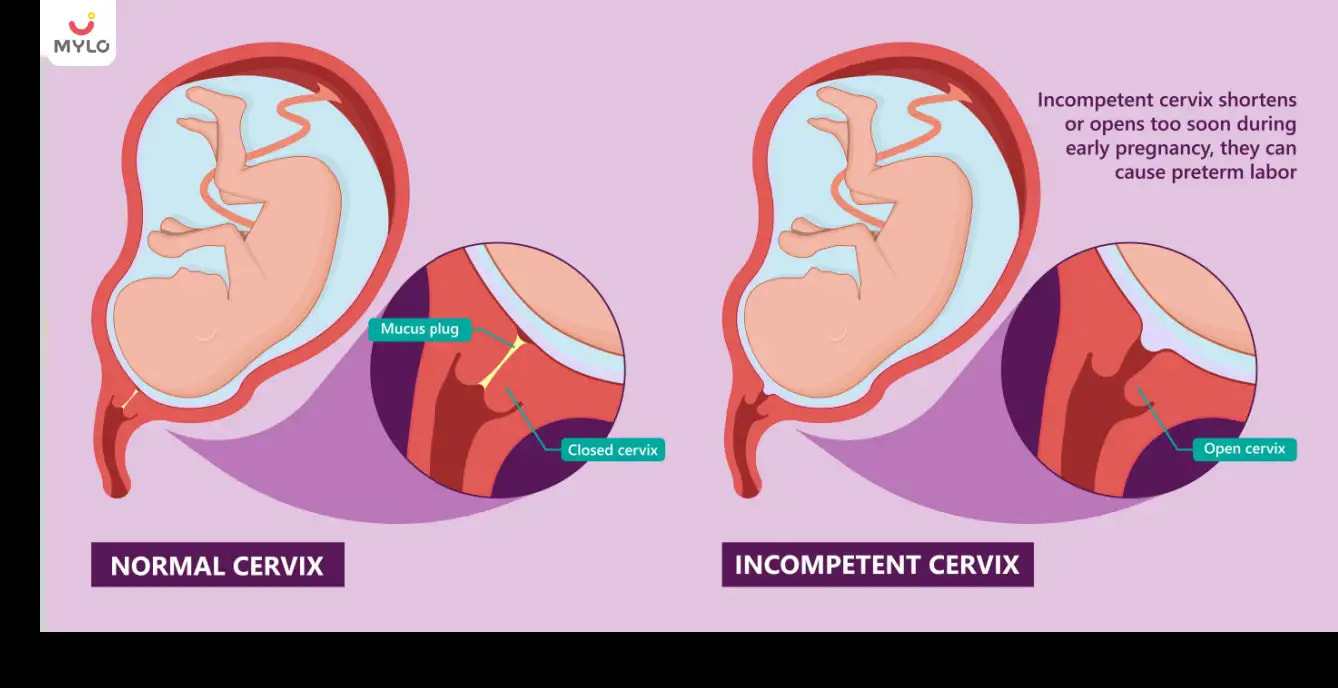Home

Incompetent cervix: Causes, Symptoms, & Treatment
In this Article

Pregnancy
Incompetent cervix: Causes, Symptoms, & Treatment
Updated on 4 October 2023
A pregnant woman's cervix is completely closed at the base. Before labor, it dilates and widens. There is a problem known as an incompetent cervix when the cervix opens too early in pregnancy (also known as cervical insufficiency). Premature birth and miscarriage are just two of the pregnancy complications that have been associated to an incompetent cervix.
What Is An Incompetent Cervix?
An incompetent cervix, also known as cervical insufficiency, develops when a woman's cervix is too weak to prevent premature birth or the loss of a full-term pregnancy.
Your cervix (the part of your uterus that enters the vagina) is generally closed and firm before pregnancy. The cervix softens, shortens (effaces), and opens as pregnancy develops and labour nears (dilates). Cervical incompetency can lead to preterm labour and delivery.
Causes Of Incompetent Cervix
Here are the causes of cervical incompetence:
1. Birth defects of the cervix might include abnormalities in the uterine cavity's natural shape.
2. Treatments for cervical cancer, such as dilatation and curettage (D&C), biopsies to detect malignancy, and LEEP, can cause damage to the cervical lining.
3. Any history of cervix injury from a previous birth.
4. The birth control medication diethylstilbestrol (DES) has been linked to various reproductive issues in women exposed to it.
5. Miscarriages have occurred repeatedly throughout the second trimester for no apparent reason.
Symptoms Of Incompetent Cervix
Cervix open symptoms in pregnancy typically manifest between weeks 14 and 20. If a woman has never had a miscarriage because to cervical incompetence, she may not recognise the early warning signs. You must immediately consult your doctor if you have any of the following symptoms.
-
Mild vaginal bleeding or spotting.
-
Pressure type of feeling in the pelvic area.
-
Symptoms similar to those of a cramp in the uterus.
-
Back pain.
-
A vaginal discharge begins white and gradually turns pink.
How To Treat Incompetent Cervix
Some potential methods of incompetent cervix treatment are:
1. Progesterone supplementation
For women with a history of preterm births, the doctor may recommend weekly injections of hydroxyprogesterone caproate (Makena), a type of the hormone progesterone, during the second and third trimesters. Progesterone has been shown to help with cervical insufficiency, but more research is needed to determine how it should be used.
2. Repeated ultrasounds
Women who have had preterm births in the past or have other risk factors for cervical insufficiency may start getting ultrasounds every two weeks around the 16th week of pregnancy. This allows for a more precise measurement of the cervix's length. A cervical cerclage may be advised if your cervix starts to open or shortens below a certain length.
3. Cervical cerclage
Cervical cerclage is a surgical procedure that may help women less than 24 weeks pregnant with a history of having babies early and whose cervix is opening to keep from giving birth too soon. A strong suture is used to close the cervix during this surgery. The sutures will be taken out at some point in the ninth month of pregnancy or during childbirth.
If you have a premature birth because your cervix isn't strong enough, your doctor may suggest getting a cervical cerclage before your cervix opens. Most doctors recommend scheduling this procedure before the 14th week of pregnancy.
Another option that your doctor may suggest is using a vaginal gadget to keep the uterus in place (pessary). Using a pessary has been shown to reduce stress on the cervix.
You may also like : Why are Some Women Recommended Progesterone Injections During Pregnancy?
How Is Incompetent Cervix Diagnosed?
A pregnant woman typically has a few tests done by the doctor in the second trimester to look for any indications of cervical incompetence. These tests are done if a woman has had a premature birth or miscarriage in the past, is feeling a bit sick, or as part of a regular physical exam. One of the following approaches to diagnosis is typically used:
1. Transvaginal Ultrasound
It is a procedure used in cervical incompetence radiological testing that involves inserting a tiny transducer inside the vagina to take ultrasound-based pictures of the cervix. When the cervix is less than 2.5 cm long, the fetal membrane is present in the vagina, and the cervix is dilated, an ultrasound of the vaginal area can reveal any discrepancies. During week fifteen of the pregnancy, this is commonly done.
2. Examination of the Pelvis
The doctor physically examines the cervix to look for any prolapsed foetal membranes or protrusions of the foetal membrane within the vagina. By this examination, the doctor can also determine whether the cervix is in good health and has sustained any physical harm. The cervix has already opened before its due date if the doctor feels the membrane of the developing baby inside it.
3. Amniocentesis
The doctor typically performs an amniocentesis if the results of the first two tests indicate an incompetent cervix. It is a straightforward laboratory procedure in which a tiny amount of the amniotic sac is taken to look for any infections in the sac enclosing the foetus.
When To See A Doctor?
A doctor will usually diagnose an incompetent cervix after a miscarriage or early birth in the second trimester. If you're pregnant and experiencing symptoms like bleeding, pelvic pain, and contractions, it's time to call your doctor.
1. Prognosis of Incompetent Cervix
Incompetent cervix treatment is possible, and the patient can fully recover. To give the developing fetus the best chance at health, treatment for this disease focuses on putting off labor as long as feasible.
2. Where do I go from here if my cervix is incompetent?
The success rate of cerclage treatment for incompetent cervix is close to 90%.
3. Can I conceive again if I have had an incompetent cervix?
Experience with an incompetent cervix increases the likelihood that a woman may experience the same problem during a subsequent pregnancy. Discuss the potential dangers of pregnancy and how to prepare for a healthy and trouble-free pregnancy with your doctor.
You may also like : Pelvic Pain in Pregnancy: Symptoms & Treatment
References
1. Lotgering FK. (2007). Clinical aspects of cervical insufficiency. BMC Pregnancy Childbirth.
2. Bieber KB, Olson SM. (2023) Cervical Cerclage. Treasure Island (FL)



Written by
Khushboo Jain
Get baby's diet chart, and growth tips

Related Articles
Related Questions
Influenza and boostrix injection kisiko laga hai kya 8 month pregnancy me and q lagta hai ye plz reply me

Hai.... My last period was in feb 24. I tested in 40 th day morning 3:30 .. That is faint line .. I conculed mylo thz app also.... And I asked tha dr wait for 3 to 5 days ... Im also waiting ... Then I test today 4:15 test is sooooo faint ... And I feel in ma body no pregnancy symptoms. What can I do .

Baby kicks KB Marta hai Plz tell mi

PCOD kya hota hai

How to detect pcos

RECENTLY PUBLISHED ARTICLES
our most recent articles

Pregnancy Precautions
Soda During Pregnancy: Is It Safe or Should You Avoid It?

Vaginal Discharge
Watery Discharge Before Period: Is It Normal or a Cause for Concern

Male Infertility
Sperm Cramps: Debunking Myths and Shedding Light on the Facts

Diet & Nutrition
Bitter Gourd During Pregnancy: Benefits and Precautions You Should Know

First Period After Failed IVF Cycle: What to Expect and How to Cope

Fertility
Freezing Eggs: The Pros and Cons of Preserving Your Fertility
- Can a Diabetic Woman Get Pregnant: Exploring the Facts and Myths
- Bulky Uterus with Fibroids: Understanding Causes, Symptoms, and Treatment Options
- Tubal Recanalization: How This Procedure Can Help Restore Your Fertility
- Are FSH (Urofollitropin) Injections an Effective and Safe Fertility Treatment For You?
- The Ultimate Guide to Choosing a Baby Massage Oil for Summer
- The Ultimate Guide to Understanding a Follicle Size Growth Chart
- Fruits for PCOS: Your Guide to Making Healthy Choices
- Is Milk Good for PCOS: Exploring the Dairy Dilemma
- The Ultimate Guide to Using Ashokarishta for PCOS
- PCOS Pain: The Ultimate Guide to Causes and Effective Management
- 10 Best Mystery Books to Read in 2023
- 10 Best Non-Fiction Books to Read in 2023
- Is Ghee Good for PCOS: The Ultimate Guide to Benefits and Ways to Consume
- Is Curd Good for PCOS: The Ultimate Guide to Debunking Myths and Discovering Benefits


AWARDS AND RECOGNITION

Mylo wins Forbes D2C Disruptor award

Mylo wins The Economic Times Promising Brands 2022
AS SEEN IN
















- Mylo Care: Effective and science-backed personal care and wellness solutions for a joyful you.
- Mylo Baby: Science-backed, gentle and effective personal care & hygiene range for your little one.
- Mylo Community: Trusted and empathetic community of 10mn+ parents and experts.
Product Categories
baby carrier | baby soap | baby wipes | stretch marks cream | baby cream | baby shampoo | baby massage oil | baby hair oil | stretch marks oil | baby body wash | baby powder | baby lotion | diaper rash cream | newborn diapers | teether | baby kajal | baby diapers | cloth diapers |




